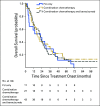Outcomes of Chemotherapy for Microsatellite Instable-High Metastatic Colorectal Cancers
- PMID: 32913995
- PMCID: PMC7446482
- DOI: 10.1200/PO.17.00253
Outcomes of Chemotherapy for Microsatellite Instable-High Metastatic Colorectal Cancers
Abstract
Purpose: Microsatellite instable-high (MSI-H) colorectal cancers (CRCs) are known to carry better survival in the local disease stage even without treatment. The influence of types of treatment on survival of MSI-H metastatic CRCs (mCRCs) is still unclear and is evaluated in this study.
Materials and methods: Patients with MSI-H mCRC treated with first-line chemotherapy, with or without bevacizumab, identified in the Israeli population-based Molecular Epidemiology of Colorectal Cancer (MECC) study, were diagnosed between 1998 and 2013 and followed up until May 2017; MSI status was determined by comparing 10 markers in tumor and normal tissue. Dates of metastases and death and treatment details were extracted from oncology records.
Results: Among 590 patients treated for mCRC, 106 (18%) had MSI-H tumors. Patients with MSI-H had a median overall survival (OS, from start of first-line treatment) of 1.6 years. The presence of a somatic B-Raf proto-oncogene (BRAF) mutation was a significant adverse prognostic factor in the MSI-H group (hazard ratio [HR], 1.8; 95% CI, 1.1 to 3.0; P = .026). MSI-H tumors without BRAF mutation (n = 87) had similar OS benefit from fluorouracil (FU) only as from any combination protocols (HR, 0.93; P = .78), whereas microsatellite-stable (MSS) tumors without BRAF mutation (n = 456) showed improved OS over FU-only regimens when combination chemotherapy with or without bevacizumab was used (HR, 0.58; P < .01; P value for interaction = .07). Patients with MSI-H/BRAF wild type (WT) had survival advantage over patients with MSS disease (adjusted HR, 0.58; 95% CI, 0.35 to 0.98) when treated with FU-only protocols.
Conclusion: Clinical outcomes differ substantially between patients with MSS/BRAF-WT mCRC and MSI-H/BRAF-WT mCRC, with measurable differences between chemotherapy regimens. MSI-H mCRCs are a clinically distinct subset of colorectal cancers. Their current poor outcome suggests that new clinical trials are needed to identify therapeutic options, potentially taking advantage of the new developments in the field of immunotherapy.
© 2018 by American Society of Clinical Oncology.
Conflict of interest statement
Conception and design: Katerina Shulman, Ofra Barnett-Griness, Stephen B. Gruber, Gad Rennert Financial support: Stephen B. Gruber Administrative support: Stephen B. Gruber Provision of study material or patients: Flavio Lejbkowicz Collection and assembly of data: All authors Data analysis and interpretation: Katerina Shulman, Ofra Barnett-Griness, Joel K. Greenson, Gad Rennert Manuscript writing: All authors Final approval of manuscript: All authors
Figures




Similar articles
-
The Association Between Mutations in BRAF and Colorectal Cancer-Specific Survival Depends on Microsatellite Status and Tumor Stage.Clin Gastroenterol Hepatol. 2019 Feb;17(3):455-462.e6. doi: 10.1016/j.cgh.2018.04.015. Epub 2018 Apr 13. Clin Gastroenterol Hepatol. 2019. PMID: 29660527
-
Outcome of Mismatch Repair-Deficient Metastatic Colorectal Cancer: The Mayo Clinic Experience.Oncologist. 2018 Sep;23(9):1083-1091. doi: 10.1634/theoncologist.2017-0289. Epub 2018 Apr 19. Oncologist. 2018. PMID: 29674439 Free PMC article.
-
Consequences of a high incidence of microsatellite instability and BRAF-mutated tumors: A population-based cohort of metastatic colorectal cancer patients.Cancer Med. 2019 Jul;8(7):3623-3635. doi: 10.1002/cam4.2205. Epub 2019 May 9. Cancer Med. 2019. PMID: 31070306 Free PMC article.
-
The Potential Value of Immunotherapy in Colorectal Cancers: Review of the Evidence for Programmed Death-1 Inhibitor Therapy.Clin Colorectal Cancer. 2016 Dec;15(4):285-291. doi: 10.1016/j.clcc.2016.07.007. Epub 2016 Jul 22. Clin Colorectal Cancer. 2016. PMID: 27553906 Review.
-
Pathological complete response with anti-PD-1 therapy in a patient with microsatellite instable high, BRAF mutant metastatic colon cancer: a case report and review of literature.Discov Med. 2016 May;21(117):341-7. Discov Med. 2016. PMID: 27355330 Review.
Cited by
-
Transformer-based biomarker prediction from colorectal cancer histology: A large-scale multicentric study.Cancer Cell. 2023 Sep 11;41(9):1650-1661.e4. doi: 10.1016/j.ccell.2023.08.002. Epub 2023 Aug 30. Cancer Cell. 2023. PMID: 37652006 Free PMC article.
-
Genomic profile and clinical features of MSI-H and TMB-high pancreatic cancers: real-world data from C-CAT database.J Gastroenterol. 2024 Feb;59(2):145-156. doi: 10.1007/s00535-023-02058-8. Epub 2023 Nov 25. J Gastroenterol. 2024. PMID: 38006445
-
Artificial intelligence for detection of microsatellite instability in colorectal cancer-a multicentric analysis of a pre-screening tool for clinical application.ESMO Open. 2022 Apr;7(2):100400. doi: 10.1016/j.esmoop.2022.100400. Epub 2022 Mar 2. ESMO Open. 2022. PMID: 35247870 Free PMC article.
-
Update on the role of pembrolizumab in patients with unresectable or metastatic colorectal cancer.Therap Adv Gastroenterol. 2021 Jun 28;14:17562848211024460. doi: 10.1177/17562848211024460. eCollection 2021. Therap Adv Gastroenterol. 2021. PMID: 34262612 Free PMC article. Review.
-
Durable response to pembrolizumab in hepatic metastasis from colonic carcinoma with Lynch syndrome: a case report.Front Immunol. 2024 Aug 23;15:1455907. doi: 10.3389/fimmu.2024.1455907. eCollection 2024. Front Immunol. 2024. PMID: 39247185 Free PMC article.
References
-
- Tol J, Punt CJA. Monoclonal antibodies in the treatment of metastatic colorectal cancer: A review. Clin Ther. 2010;32:437–453. - PubMed
Grants and funding
LinkOut - more resources
Full Text Sources
Research Materials
Miscellaneous

